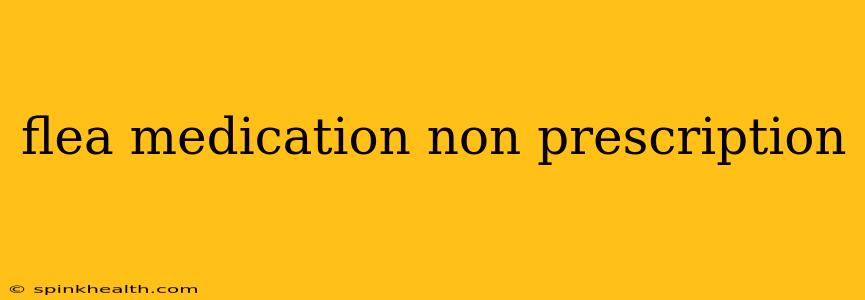Dealing with a flea infestation on your beloved pet can be incredibly stressful. The constant itching, the relentless scratching, and the worry about potential health complications can leave you searching for a quick and effective solution. While a vet visit is always recommended for persistent or severe infestations, many mild cases can be managed with readily available, non-prescription flea medications. Let's explore the options and navigate the choices safely and effectively.
This journey began for me when my scruffy terrier mix, Barnaby, started scratching incessantly. Initially, I dismissed it as a minor irritation, but the constant scratching led to raw patches on his skin. That's when I realized I needed to take action. My research led me down the path of understanding non-prescription flea treatments, and I want to share my learnings with you.
What are the Non-Prescription Flea Medication Options?
Several non-prescription options exist for treating flea infestations in pets. These typically fall into a few categories:
-
Flea Combs: These are perhaps the simplest and oldest method. Regular combing removes fleas and flea dirt (flea feces) from your pet's coat. It's a great preventative measure and helpful for removing some fleas already present. However, it's not a complete solution on its own for a large infestation.
-
Flea Sprays: These sprays contain insecticides that kill fleas on contact. They're often applied directly to the pet's coat, but it's crucial to choose a pet-safe formulation and follow the instructions carefully. Always test a small area first to check for any adverse reactions.
-
Flea Shampoos: Flea shampoos work similarly to sprays, killing fleas through contact. They require thorough rinsing, and it’s essential to avoid getting the shampoo in your pet's eyes. They're often used in conjunction with other methods.
-
Flea Collars: These collars release insecticides slowly over time, providing ongoing flea protection. The effectiveness varies depending on the brand and quality. Always ensure the collar fits your pet properly and is suitable for their age and size.
How Effective are Non-Prescription Flea Treatments?
The effectiveness of non-prescription flea treatments depends on several factors, including the severity of the infestation, the type of product used, and how diligently you apply it. For minor infestations, these options can be quite effective in bringing the situation under control. However, for more serious problems, they might not be sufficient on their own.
Are There Any Side Effects of Using Non-Prescription Flea Medication?
While generally safe when used as directed, non-prescription flea medications can cause side effects in some pets. These may include skin irritation, allergic reactions, or gastrointestinal upset. Always check the product label for potential side effects and watch your pet closely after application. If you notice any unusual symptoms, contact your veterinarian immediately.
How Long Does it Take for Non-Prescription Flea Medication to Work?
The time it takes for non-prescription flea medication to work varies depending on the product and the severity of the infestation. Some products offer immediate killing action, while others provide longer-lasting protection. You might see a reduction in flea activity within a few days, but complete eradication might take longer, potentially requiring repeated applications.
When Should I See a Veterinarian About Fleas?
While non-prescription treatments are suitable for managing minor flea infestations, you should seek veterinary help if:
- The infestation is severe.
- Your pet shows signs of severe skin irritation or allergies.
- Your pet is not responding to non-prescription treatments.
- You suspect your pet has a secondary infection due to scratching.
- Your pet is a puppy, kitten, or senior animal with a compromised immune system.
Barnaby's story has a happy ending. After consistent combing and the use of a pet-safe flea spray, his incessant scratching subsided, and his skin began to heal. Remember, early detection and appropriate treatment are key to preventing a minor flea problem from becoming a major health issue. Always prioritize your pet's well-being and consult your veterinarian when in doubt. They can provide tailored advice and recommend the best course of action for your pet's specific needs.

